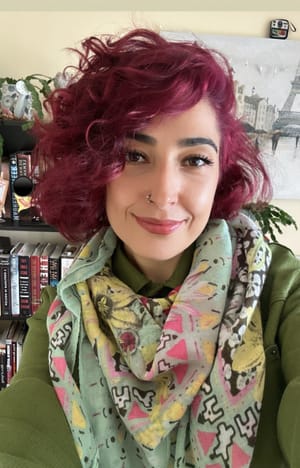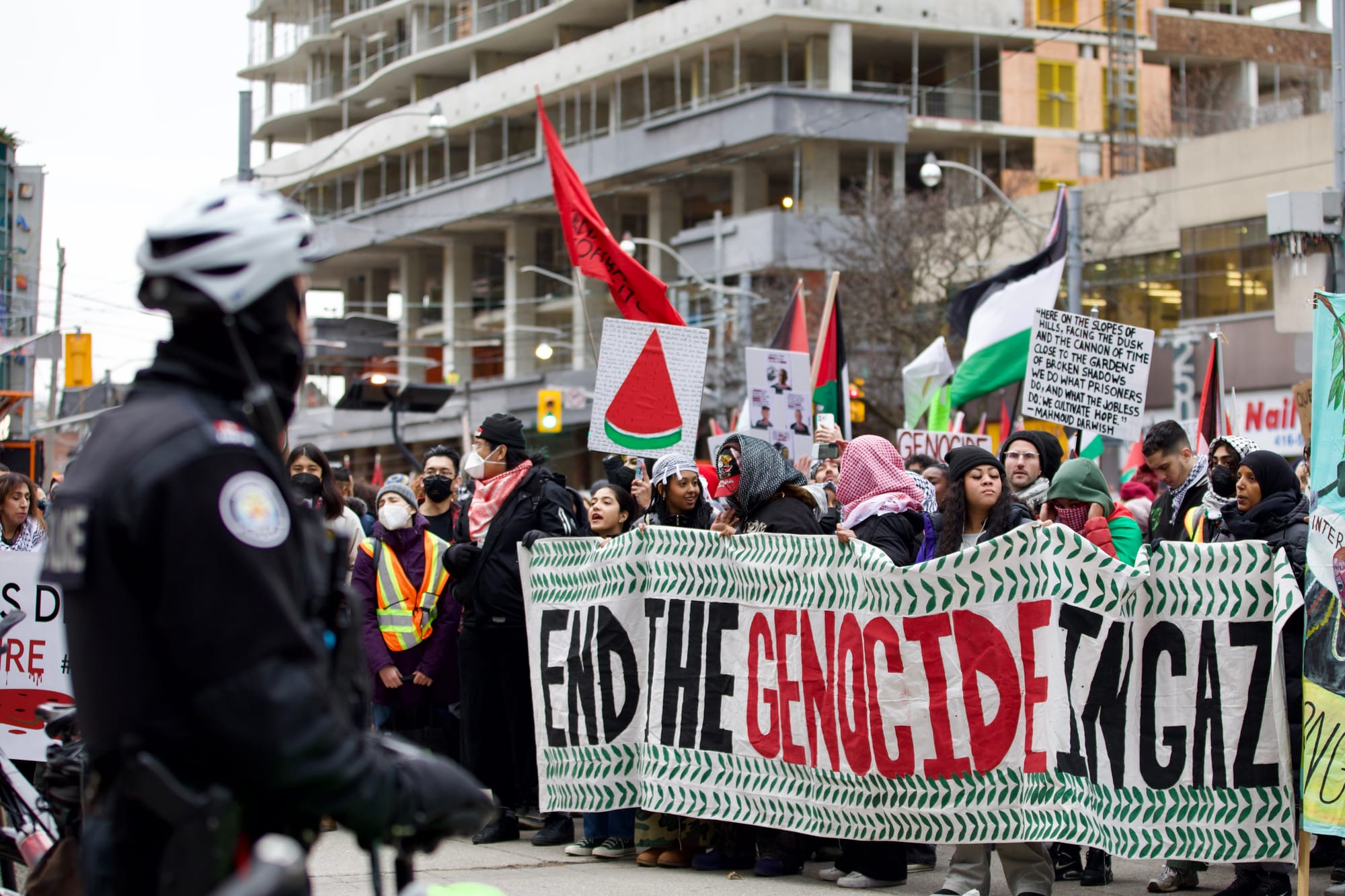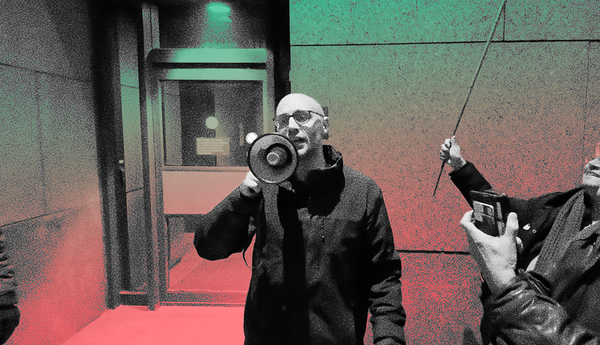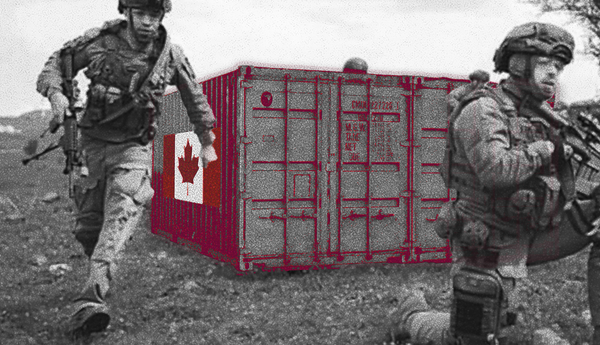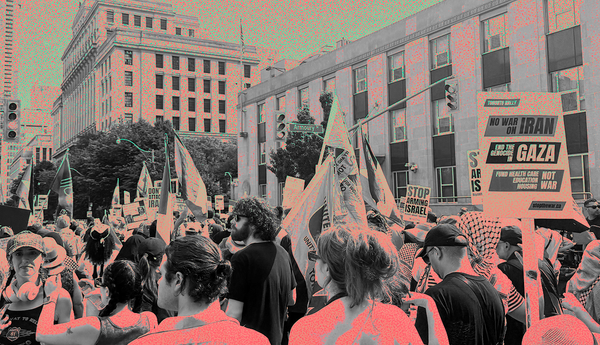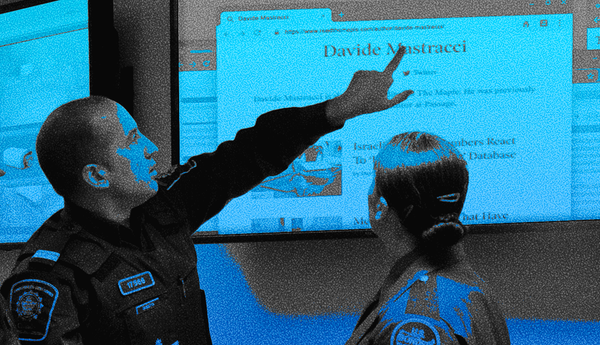Two peaceful Human Rights Day rallies took place in Toronto on Sunday in solidarity with Palestine. One of the demonstrations saw police violently arrest a protester.
Torontonians gathered at University Ave., in front of the U.S. Consulate, and at Yonge and Dundas Square to demand a ceasefire and an end to Israel’s attacks on Gaza, which have so far killed approximately 18,000 people since October 7.
According to a witness who spoke to The Maple at the scene of the arrest, police on foot knocked a woman on a bicycle to the ground. After seeing the woman on the ground, there was an argument between another demonstrator and a police officer.
Police then pushed the demonstrator to the ground before arresting him. Video footage of the incident shared to social media showed an officer punching the demonstrator as he lay pinned to the ground.
“The Toronto Police began by escalating with attendees and being violent with them and then proceeded to arrest a man and assault him,” Dalia Awwad, one of the rally organizers and a member of the Palestinian Youth Movement, told The Maple.
The demonstrator was charged with obstructing and assaulting a peace officer, according to a police statement.
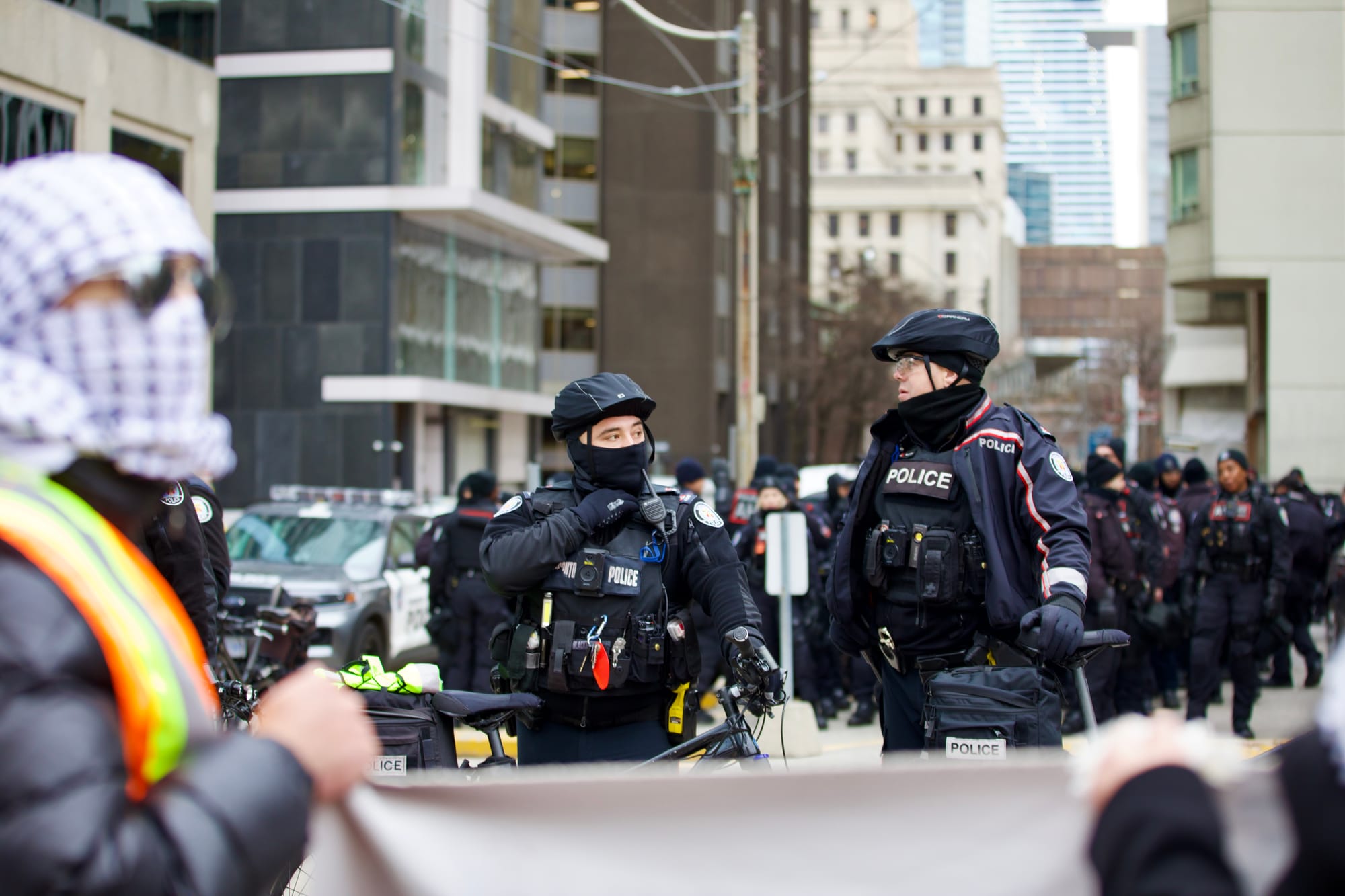
Following the demonstrator’s arrest, other attendees at the rally marched to the Toronto Police 52 Division on Dundas St. and chanted “let him go” until he was released at around 6.30 p.m.
Awwad said that the protesters were “refusing to back down, sending a clear message that if they come for one of us, we all show up, and we stay here until that person is released.”
“We expect them [the police officers] to let us practice our rights and freedoms that are stated in the Canadian Charter of Rights and Freedoms,” protester Abeer Eid told The Maple. “We have the right to peaceful assembly. We have the freedom of speech and expression of our opinion, and they are trying to stop us from that. Shame on them.”
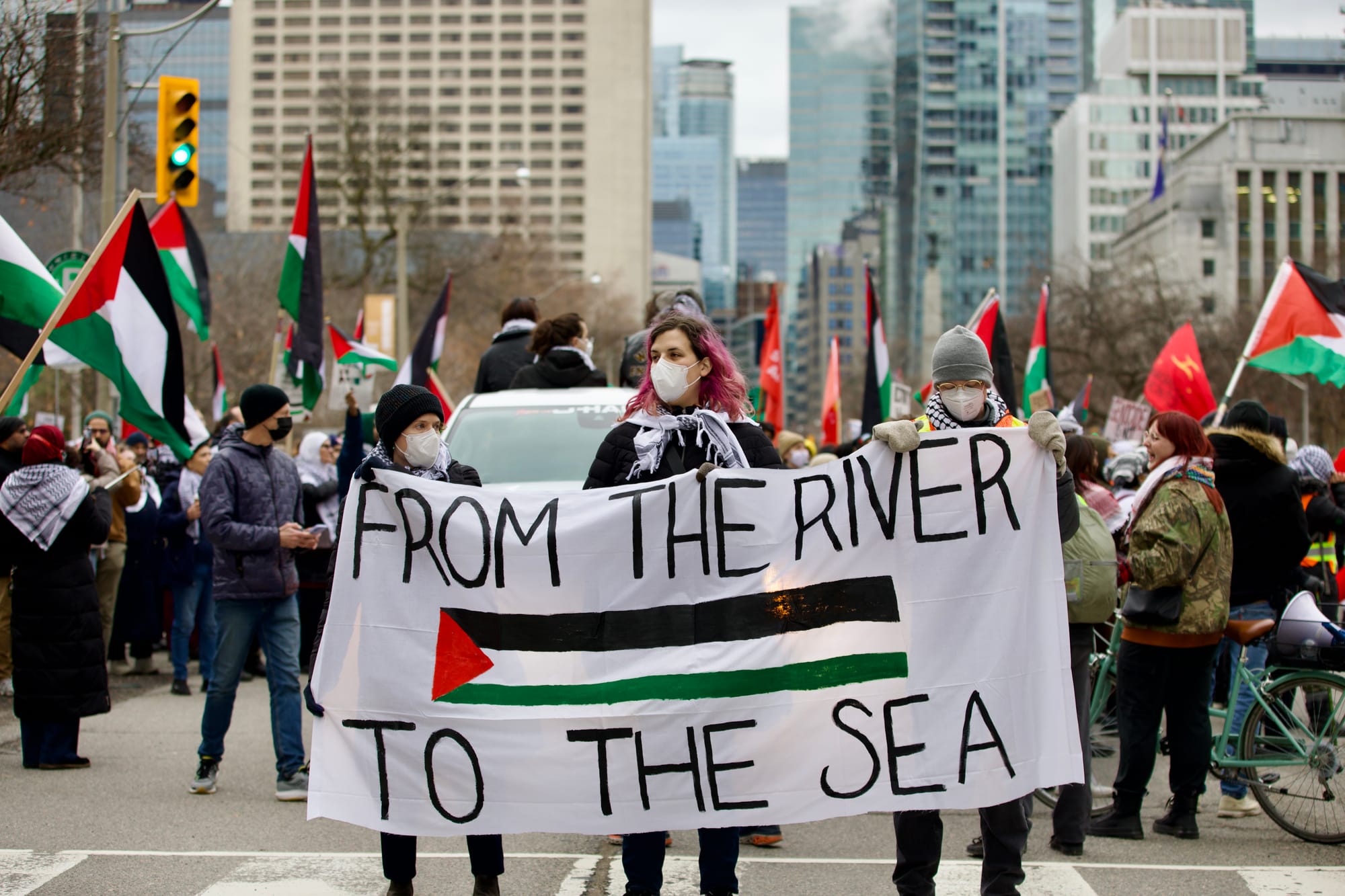
Eid said she has lost over 120 relatives in Gaza, and noted that many are still trapped under rubble in the besieged enclave.
“Enough is enough. How many more people have to die for the government to ask for a ceasefire?,” Eid said. She noted that Prime Minister Justin Trudeau has repeatedly said Israel has the right to protect itself. Eid said: “Against whom? Against the defenceless civilians, children, women [...] against mosques, against churches, against hospitals.”
“They killed innocent premature babies inside the incubator by cutting the power.”
In November, 28 babies were taken to Egypt from al-Shifa Hospital in Gaza for urgent treatment. However, at least five other newborns died before the evacuation due to power outages.
Protest Marked On Human Rights Day
December 10 marked the 75th anniversary of the Universal Declaration of Human Rights, which states that everyone is entitled to fundamental rights everywhere, including the rights to “life, liberty and security of person.”
Some of those who attended the rally in Toronto said the day was all the more poignant in light of the situation in Gaza.
“It is unconscionable, especially on International Human Rights Day, to watch the continuous bombing of Gazans,” Gur Tsabar, a member of Independent Jewish Voices and Jews Say No to the Genocide Coalition, told The Maple. “There is no word to describe what is happening, and it is atrocious that the world is not moving faster.”
“The Canadian government is complicit in this brutality and this genocide. Our taxpayer dollars are funding this genocide. Justin Trudeau is not standing up for basic human rights, and I think it’s unforgivable.”
Since launching its attack on the Gaza Strip, which is taking place alongside an uptick in military attacks in the occupied West Bank, Israel has destroyed residential areas and infrastructure. UN Secretary-General António Guterres and the medical charity Doctors Without Borders have repeatedly warned that a “humanitarian catastrophe” is sweeping across Gaza.
Health officials in Gaza have warned that nowhere in the besieged region is safe, after Israel instructed nearly two million Palestinians to evacuate to an enclave smaller than London’s Heathrow Airport. A displaced resident of Gaza told BBC News last week that the so-called “safe zone” designated by Israel is “not a place for human beings,” as the area grapples with shortages of food, water and power.
Aid organizations, meanwhile, have warned that overcrowding in refugee camps, along with a breakdown in sanitation infrastructure, are fuelling an increased risk in the spread of diseases such as cholera and pneumonia.
Hunger is also a serious threat to civilians in the region.
Nearly 400 households across the Gaza Strip took part in a rapid food assessment by the World Food Programme conducted during the temporary humanitarian pause in fighting between November 27-30.
Thirty-six per cent of those surveyed in the region’s northern area suffered from “very severe hunger,” and almost half were experiencing “moderate hunger.” Overall food consumption was in a poor state for 82 per cent of households in the north, and 38 per cent of those in the south.
Anger At Silent Politicians
Several support and solidarity groups also participated in the Toronto rallies, including Queers for Palestine.
Kavita B, a member of Queers for Palestine Toronto, lamented the Trudeau government’s refusal to join international calls for a ceasefire.
“There have been petitions; there have been rallies outside of many Liberal MPs’ offices, and yet they are not responding to the calls directly from their constituents,” Kavita said.
Kavita noted a recent example of human rights abuses being carried out by Israeli forces.
Last week, Israeli forces arrested at least 100 Palestinian men and boys aged 15 years and older who were sheltering in a school in Beit Lahiya. The detainees were tied up and had their clothes removed, paraded in a Gaza street, and then taken to an unknown location.
As images of the detainees stripped to their underwear circulated online, some were identified as civilians with no connections to militant activities. According to Ha’aretz, the Israeli military later admitted that only “10 to 15 percent” of the photographed prisoners were “Hamas operatives or are identified with the organization.”
Human rights monitors condemned the Israeli military’s actions as “inhuman” and amounting to torture.
Kavita said: “We saw the images of Palestinian men being stripped and blindfolded and arrested, being made to sit in the streets, naked in front of their families before being [...] taken away.”
“That level of dehumanization is only possible when we do not consider people to be human anymore.”
Nur Dogan is a Turkish-Canadian freelance journalist and photojournalist who covers stories for New Canadian Media.

